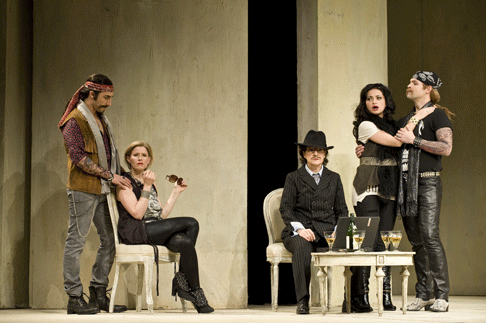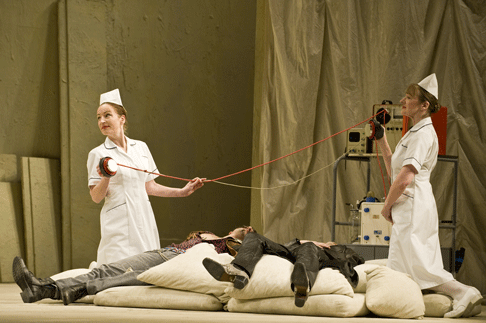02 Feb 2010
Così fan tutte, Covent Garden
First seen in 1995, and here receiving its seventh revival, Jonathan Miller’s Così fan tutte has lost none of its power to unsettle and discomfort.

First seen in 1995, and here receiving its seventh revival, Jonathan Miller’s Così fan tutte has lost none of its power to unsettle and discomfort.
This is not a buffa trifle, which sends the audience home feeling amused and rather smug; indeed, discussing Charles Lamb’s description of the work as an ‘artificial comedy’, in the programme Miller himself notes that “within such as idiom the awkward improbabilities of the plot can be seen as a device that helps to make the opera more, rather than less, serious”.
Certainly, the visual impression created by the stark, but elegant, modern sets — scattered with a few throwaway allusions to the grand classical tragedies of Gluck — is one of coldness and aloofness. The ladies’ house is mid-refurbishment, and in such minimalist surroundings, with little to distract the eye or nourish the soul, it’s no wonder that the cast are enwrapped in solitude, absorbed by their mirrors, magazines and iPods. Having updated the original production, Miller cleverly uses such props to lighten the cynicism: Despina types the marriage contract on a laptop, and the ubiquitous mobile ’phones crop up in almost every scene — the sisters snap away with their cameras, Alfonso ‘calls a friend’ to summon a military drum roll, and a sweeping flourish on the continuo neatly serves as a tinkling ring tone.
 William Shimell as Alfonso
William Shimell as Alfonso
The uniformly accomplished cast certainly had the measure of the concept,
and the acting was superb throughout. Relaxing into her glamorous boots, Nino
Surguladze enjoyed flirting and flouncing as a coquettish Dorabella; 'È amore
un ladroncello' proved that she was equally secure at both ends of her
register, and displayed her warm, supple tone. Sally Matthews offered a
controlled, detailed performance as Fiordiligi, alert to the subtle nuances,
intensely introspective and self-restrained. Indeed, in her effort to totally
embody the staid stoic, Matthews tried a little too hard, and her voice was at
times rather too inflexible; she certainly had the technical arsenal to cope
with the outlandish angular leaps of ‘Come scoglio’, and the high B
at the end of 'Per pietà' was spot on; her unravelling in Act 2 was conveyed by
a rich array of different vocal colours, and she displayed an impressively
resonant lower register; but, overall her voice lacked a certain warmth, and
her arias failed to move this listener. Maybe this was apt for Miller’s
conception, but it felt a bit too flinty and dry for me — we marvelled at
the technical prowess, laughed at her pride, pitied her fall, but did not
genuinely feel for her in her disillusionment.
The boys enjoyed their outlandish disguises — flowing locks, bandannas, black leather and shades — indulging in much horseplay, posturing and melodrama. As a heavy metal aficionado, Gulglielmo (Troy Cook) was suitably cock-sure, and petulant in his comeuppance, angrily muttering uncharitable thoughts during the Ab canon at the wedding. Charles Castronovo has a light but emotive voice, perfect for the soulful hippie, Ferrando; he was on outstanding form all evening. His cavatina, ‘Tradito, schernito dal perfido cor’ was ravishing. And, in his duet with Matthews, ‘Per gli amplessi’, both characters were not only effortlessly seductive, but rightly and totally absorbed by the beauty of their own singing and by their romantic vision of Love.
 (Left to Right) Charles Castronovo as Ferrando, Sally Matthews as Fiordiligi, Helene Schneiderman as Despina, Nino Surguladze as Dorabella and Troy Cook as Guglielmo
(Left to Right) Charles Castronovo as Ferrando, Sally Matthews as Fiordiligi, Helene Schneiderman as Despina, Nino Surguladze as Dorabella and Troy Cook as Guglielmo
Don Alfonso (William Shimell) was appropriately cool and debonair, elegantly reclining to observe the shenanigans with amused distaste, but sometimes too detached to be convincing as the arch manipulator. From the opening trio, he seemed underpowered vocally although he did warm up as proceedings progressed, playing a more decisive role in ‘Soave sia il vento’; and, in fact, the lack of lustre to his tone, and the frequent absence of vibrato, did lend him a sad, resigned air, as he subtly guided his dupes from the sidelines.
Helene Schneiderman was a natural as Despina, an amoral good-time girl who really couldn’t see what the fuss was all about, and who encouraged us to see the idiocy of her mistresses’ self-delusions. Both of her two short arias were proficiently despatched, but it was in the recitatives that she shone, as a sharp PA, soothing the over-anxious ladies with cups of Starbucks and Prozac, rattling off the witty barbs and lampooning their pretensions.
 A scene from Così fan tutte
A scene from Così fan tutte
Making her debut at the ROH Julia Jones created a light-hearted, flippant musical fabric, expertly teasing out the woodwind solos which play such a subtle role in the drama. Balance and unity between stage and pit was superb, although I would have liked a swifter pace at times.
It may be an opera of ‘pairs’ but ultimately Miller’s ‘couples’ are isolated individuals, alone with only their self-regard for companionship. Mozart’s music may evoke the supreme beauty of love, and suggest the sincerity of their affections, but the musical and dramatic irony is piquant. Miller’s vision punctures the profundity of their self-deceiving ardour, and his symbolism is apt: as the intense self-absorption of Fiordiligi, as she gazes adoringly into the mirror, suggests, the only thing these solipsists truly love is themselves.
Da Ponte’s libretto has been condemned as absurd, cynically immoral and tritely trivial — Miller’s reading is all these things … and utterly convincing! The great Charles Rosen complained that Così was not ‘true to life’ but merely faithful to an eighteenth-century view of human nature, but I would suggest that Miller proves him wrong. The opera is to some extent a ‘closed system’; but this is not to say that it is not relevant to the outside world, or a reflection of our own. While the mobile ’phone gags may be less fresh than they were fifteen years ago, Miller’s updating, with its unconsoling conclusion, succeeds in convincing us that not only are ‘they all the same’, but so are we.
Claire Seymour